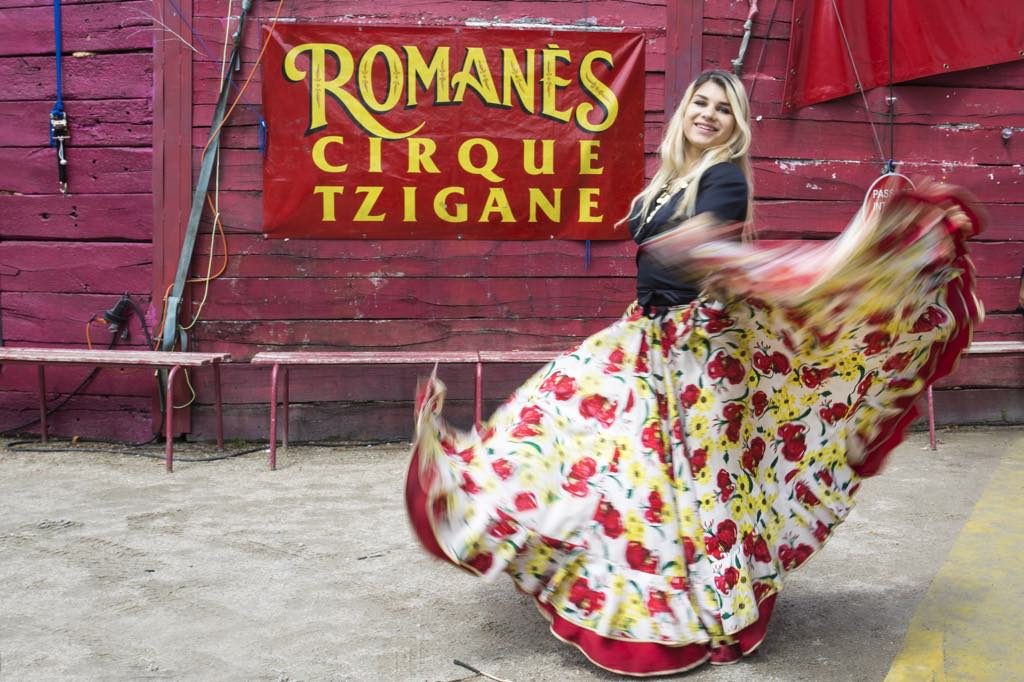
Update, July 21, 2019: On July 4, Paris Mayor Anne Hidalgo presented Délia and Alexandre Romanès with the Médaille Grand Vermeil de la Ville de Paris, the city’s highest honor, in recognition of their work in preserving tzigane culture and, by extension, promoting tolerance for all minorities.
Mayor Hidalgo hails from San Fernandez, in the “flamenco triangle” of southern Spain, and although she didn’t put on her flamenco shoes, she spoke about why this gave her a feeling of shared culture with the tzigane community. (Tziganes are Romani people from Eastern Europe, while gitans are those from Spain and southern France. With common roots, they both keep alive their vibrant music and dance traditions).
After the speeches, the Romanès band struck up, and a flamenco dancer began to stamp, clap and twirl, joined by Délia and eventually everyone in the room, including the mayor herself. This was surely the first time the opulent salons of the Hôtel de Ville had been the scene of a colorful tzigane celebration!
The friendship between the City of Paris and the Romanès circus goes back 25 years, distinguishing Paris, in Délia’s words, as “the only city in Europe to support tziganes,” an example we hope will be followed by others. As the mayor said in her speech, the city has a history of welcoming not only refugees but also artists of all kinds who have come here to “frotter” (rub up against) other cultures. That’s a good description of the hard-to-quantify appeal of a city that has far more to offer than the static beauty of its monuments.
Alison Culliford
Alison’s original article: Billed “the last Tzigane circus in the world,” the Romanès Cirque Tzigane has been entertaining Paris audiences in its tiny candlelit châpiteau for 25 years. The fact that it is a circus is almost irrelevant, however, for the circus arts are just a gateway for Alexandre Romanès and his wife, Délia “la terrible,” to invite gadjos (non-Romani) to step into their magical world.
It’s a world that Alexandre himself only discovered when he went to a Romani encampment outside Paris to seek solace among his own people. Born into a famous Parisian circus family, whom he rejected for their materialism, he found in a group of escapees from Nicolae Ceaușescu’s Romania the true expression of Tzigane culture. He married Délia, they hired a group of musicians, and the adventure began.
Life has never been easy in the hinterland between Romani and secular life, however. Though Paris’s city hall has long supported the troupe, letting them stay on municipal land, currently at Porte Maillot in the 16th arrondissement, the circus has been subjected to racist attacks and now to dwindling audiences because of the site’s proximity to Gilets Jaunes (Yellow Vests) protests.
The climate of fear surrounding the rise of right-wing extremism has now led to their rejection by the cities that habitually host them during their summer tour: Bordeaux, Lille, Strasbourg, Rennes, etc. For this reason, and for the second time in their existence, they are holding a “spectacle de soutien” on June 29 at 4 pm.
The special performance is an act of defiance to show the authorities that have shut their doors to them that they have enormous support, even from those in high places. The last time they put on a show like this to protest Nicolas Sarkozy’s expulsions of Romani, including members of their band, several famous faces from the worlds of theater, film, politics and intellectual life showed up. The atmosphere was electric.
Don’t expect glittering costumes or safety nets. Romanès Cirque Tzigane is raw and exhilarating, poetic and delightfully homemade. The mainly family members draw their courage from the will of the audience; spectators are not just observers but rather feel like an integral part of the show.
Along with derring-dos on a slippery pole, a poetic trapeze act performed on flowing lengths of fabric and a quirky juggler who looks like he stepped out of a Turkish shadow play, there are swirling flamenco dresses (long skirts are worn not just to be pretty but as a proud expression of female modesty) and a Dervish dance by the charismatic Rose.
Although Alexandre was once a lion tamer, the only animals in this circus are a domestic cat – the star of the show – and a goofy dog. As you walk between the picturesque caravans to leave, you may feel you have left a little bit of your heart in the Romanès village. Long may it continue!
Favorite